My past two blog posts have been focused on open world gaming. These posts have been continuations of an earlier post about the narrative "limbo" that many open world games create via their quest structures. In the first post in this second series, I pointed out what I perceive to be a problem with open world games that insist on turning their sandbox worlds into little more than convoluted mission-select screens and collectible checklists. In the following post, I described some games that I think managed to make successful open worlds by including features or mechanics that made traveling through the space (or knowledge of the space) into a meaningful mechanic. This time, I want to go back to some of the games that I singled-out in the first post in this series, and brainstorm some ways that they could have made better use of the large spaces that their maps offered so that traveling around the world wouldn't become so boring later in the game.
But before I do that, I want to re-emphasize that I don't hate these games. They're good games. They're just not very good at using their space, and that's what I'm criticizing. I pick on games like Skyrim and The Witcher III a lot, but I like them just fine - I bought the DLC for both. I pick on them, not because I hate them, but because I do like them and I want them to get better (or for their sequels to get better). Rather, my objective here is to find ways for these games to make better use of the large, open spaces that they provide the player, so that exploring the map feels more mechanically relevant, more interesting, or more rewarding; and to feel less like a time-sink.
Games like Skyrim and The Witcher III have massive worlds, but do a poor job of utilizing the space.
Bethesda's Skyrim and Fallout titles, as well as CD Projeckt Red's Witcher III and Rockstar's Grand Theft Auto V, already have open worlds that transcend being simple, convoluted mission-select screens like games like Assassin's Creed and Metal Gear Solid V. They populate their worlds with little narrative world-building details that make their worlds feel alive and lived-in (even though they may feel stagnant). So what could a game like Skyrim or The Witcher III have done to improve its open world?
Less rote repetition Skyrim's harsh wilderness
In the case of Skyrim, I think the biggest problem was the rampant rote repetition of dungeons. I quickly ran out of interest in exploring the map for caves and dungeons because they all felt so similar and offered random magic items that I never used. So they weren't fun to play, and the reward wasn't worth the time and trouble. Instead of having a hundred dungeons all based off of the same five or six art palettes, with the same enemies and same puzzles, Skyrim could have focused on a one or two dozen dungeons, each with unique designs, more varied enemies, varied puzzles, intimidating bosses, and more thematic rewards.
This would hopefully make exploring and finding those caves and dungeons feel more rewarding and worthwhile - even for people who aren't compulsive completionists who have to get all the loot just because it's there. It would also help if more (if not most - or all) the dungeons would provide some kind of meaningful reward that would contribute towards defeating the dragons, and thus feel like it's servicing the story. That way, even when story missions aren't scripted to force you into these dungeons, you'd actually feel like exploring them is practical rather than just an idle pass time or distraction from what is supposed to be an critically necessary story objective. Moving more of the main quest activities out into the overworld would also help make the space feel more like it is being used. The Dragonborn DLC was actually pretty good about having more activity going on in its overworld map.
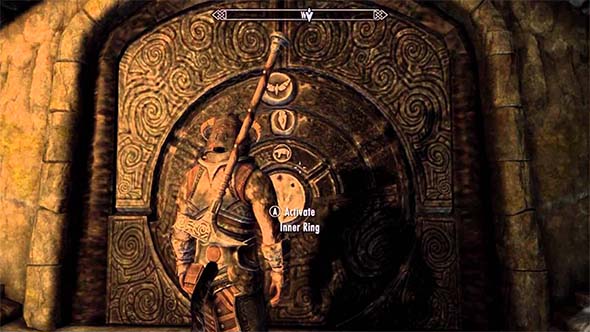
The lack of variety in dungeons eventually made the world feel repetitive and less fun to explore.
As I pointed out in my review, Skyrim's harsh environment was ripe for the inclusion of survival mechanics (or a hardcore mode akin to Fallout: New Vegas), in which weather conditions could weaken or kill your character, thus forcing you to take cover in the game's caves and dungeons. Having to keep your character protected from the elements, fed, hydrated, and well-rested would have added an element of attrition and resource-depletion that would have added a thematic strategic element to your explorations. It could have also served to more tightly focus the player's questing and story progress, since you'd be less likely to engage in minor side quests if there were more important things to do and going out of your way would cost you more resources.
Geralt can't be everywhere at once
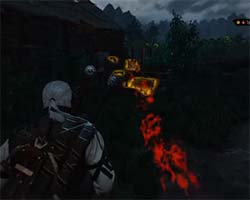
Tracking quests feature player-driven exploration.
Before I proceed to my suggestions for The Witcher III, I want to give the game credit where credit is due. One thing that The Witcher III does really well that Skyrim doesn't do is setting quests out in the open world landscape. There are numerous quests that require Geralt to use his witcher sense to track monsters through forests and swamps, or to search an area for clues. These are a good way of engaging the player with the space because the game usually doesn't just mark the destination on the map the way that, say, Skyrim would. Instead, it highlights a broad area on the map, and you have to explore the space to find the clue to proceed to the next area. The points is that you don't know, in advance, where this trail will lead you, and so the exploration of the space is player-driven. I probably should have included this in my previous post about successful open world mechanics, but I forgot to, so I'm mentioning it here. Again, credit where credit is due!
The Witcher III, I think needed a different approach to its story. Instead of a story that tries to falsely require the player to rush through the majority of the game out of a fear of consequences that never happen, the game should have put more focus on Geralt acting as a travelling monster-hunter in a world growing increasingly resentful towards his kind.
I felt that the strongest moments of the game (outside of the exceptional Bloody Baron questline) involved the themes of racism and bigotry, but these themes remained mostly irrelevant to the main story or to the mechanics of the game itself. Exploring the map to find jobs, and being kicked out of cities and into the countryside by bigoted townsfolk, would have forced the player to actually use large chunks of the map that the main story never actually explores. Your actions during this time could have affected public perception of witchers, while also slowly building towards the more dramatic storyline about finding Ciri. Perhaps this is a case in which faithfulness to the source material tied the designers' hands? I don't know, as I never read the books.
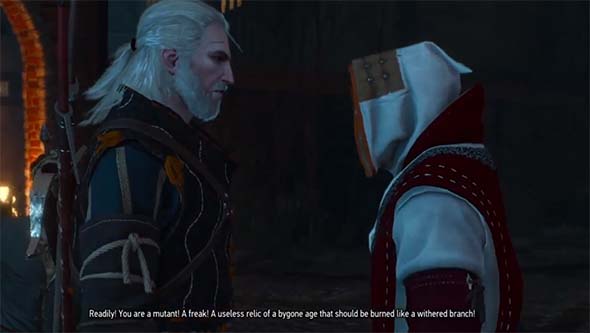
Being kicked out of towns by racist or bigoted townsfolk could have
forced Geralt to explore the world and find work in the countryside.
I actually get the feeling that this may have been the designers' original intent, but for whatever reason it got cut or scaled back. The game's introductory vignette actually highlights this element of the setting that ends up being little more than a minor theme in the one area of Novigrad. The theme is repeated in Triss' questline and then again in the late-game recruitment of the Lodge sorceresses, but it never impacts Geralt directly and has no relation to the overarching plot about the Wild Hunt (or the narrative curve-ball that was the White Frost sub plot). One could argue that it's just a world-building detail. But I think it was originally meant to play a larger role in the game as a whole because there's actually a "big decision" vignette describing how the population of Novigrad extends its persecution out to all non-humans. These vignettes are reserved for parts of the story that the player can change, but the one about racism in Novigrad seems to be the only exception in that I'm not aware of any way for the player to influence it or change the outcome.
Another approach that this game could have taken would be to emphasize the point that Geralt can't be everywhere at once. Having time-sensitive tasks that force Geralt to manage his time and exploration could have introduced some tough choices regarding which quests you chose to complete and which ones you are forced to decline or abandon. A good example is Triss' request to help her evacuate sorceresses and magic users from Novigrad before the witch hunters catch them (back to the racism again). If this quest had a statue of limitations or a time limit associated with it (which would have made perfect sense given the context), then it would have forced the player to possibly abandon any ongoing quests or to leave Triss and her friends to handle the situation themselves. Both choices would have certain consequences. Failure to complete quests that you'd already committed to would hurt your standing with the locals, and could result in fewer contracts being offered to you later on, or quest-givers refusing to give you money up-front because you've lost their good-will. Declining Triss' request for help could result in the death of her compatriots and a loss of trust and affection from Triss (including a premature end to any plans the player might have to romance her).
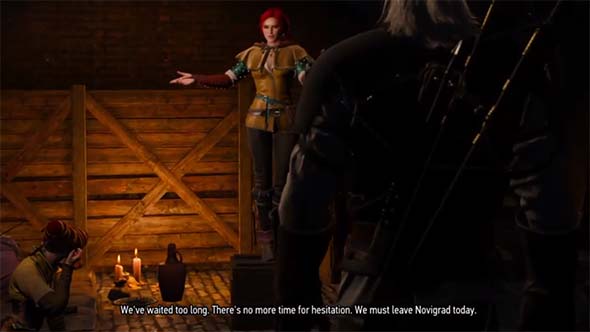
Some quests should have been time-sensitive or mutually-exclusive, forcing tough decisions.
This could have extended to the overarching plotline involving the search for Ciri. Taking time out to do side quests and favors for friends could have had effects on the fate of Ciri. Dallying too long could have resulted in the Wild Hunt finding her first, her being more severely injured, or other negative effects. This could have resulted in her being killed or otherwise unable to help in the Battle of Kaer Morhen, which could have had the side effect of some of Geralt's allies being killed as well. Alternatively, delays could have a negative effect on the world, rather than on Ciri. The Wild Hunt's pursuit of her could ravish towns and villages in the world, or it could have triggered the White Frost to start happening, progressively freezing whole areas of the map (thus making that plot thread relevant to gameplay). So all the micro-decisions of where you chose to explore, how long you spend there, and which quests you decide to complete while you're there would have ripple effects throughout the rest of the game.
I understand why many developers shy away from these sort of consequences in games. Develpers tend to want to give open world players the freedom to experience most of the game's content in a single playthrough, which means limiting how many quests or activities are mutually exclusive. It's also important to keep the consequences perceivable, so that the player understands what the risks are when he or she makes a decision in a game. But in a game like The Witcher, which is all about making difficult choices (some of which have consequences that are not immediately obvious), I think that this sort of design philosophy can work. It's maybe not the best approach for a game like Skyrim, but I can see it working in a game like The Witcher.
Make Assassin's Creed about free-form assassinations
Ubisoft's Assassin's Creed franchise may be too fargone to save itself, but I think that Shadow of Mordor, Hitman, Metal Gear Solid V, and even Ubisoft's own Far Cry games can provide excellent examples of what Assassin's Creed could do to improve itself. Specifically, it should move away from the scripted, set-piece mission designs that it's been employing lately, and focus more on free-form, player-driven assassinations. Instead of the plot-critical assassinations being part of a mission, they could just be a set of objectives that you perform at your leisure in whatever method you desire. You know, like in a sandbox.
Targets of assassination could persistently exist in the game world. Players would then have to undergo missions to discover the identity of the target, then tail them to learn their daily routines, interrogate henchmen or acquaintances for the target's strengths and weaknesses, and then use the knowledge that you gain and any tools at your disposal to dispatch the target.
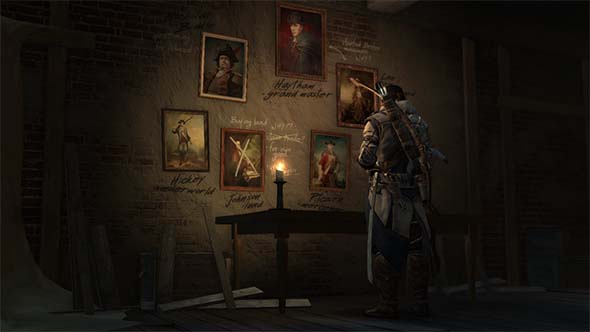
Assassin's Creed should give the player more agency in planning and executing assassinations.
There could be mechanics that cause the Templars to increase their body guard or add additional sentries to the places they most commonly visit. Maybe even have ways to make assassinations look like accidents so long as you don't keep repeating the same method. This could force the player to vary your tactics, while also providing a natural escalation of difficulty.
I'm imagining a system in which you could learn that a Templar Lieutenant likes to visit a mistress every Wednesday night. So the player is able to (on your own accord) track down where that mistress lives (or tail the target to her house), then hide out in her bedroom and ambush him when he's naked, defenseless, and completely vulnerable. Maybe you can even frame the mistress in order to throw the Templars off suspecting an assassin agent. Or maybe you could just flat-out hire her (with the crap-tons of money that you earn but never need to spend) to poison him.
Of course, the game's combat engine would also have to be reworked so that it's much harder than it currently is. This sort of approach will never work as long as jumping into a crowd of bodyguards and killing them all remains the easiest solution. The point is that it all needs to be free-form, so that the player is free to chose when, where, and how to make the killing blow. Assassin's Creed should be about assassinating people. Go figure.
Robbing banks and taking vacations in Grand Theft Auto V
Grand Theft Auto V takes a different approach than many of the games discussed above. It focuses less on filling its map to the brim with content, and instead focuses on establishing a lived-in world. The incredible amount of detail packed into the world makes it feel much more like a real place, and the sparseness of the map even helps to contribute to this. The rural areas and back country really do feel wild and off the beaten path. This is pretty solid world-building.
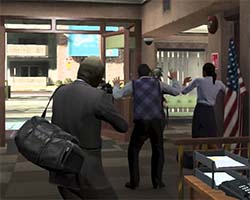
GTA V should have given players freedom
to plan out their own heists of rural targets.
The problem with Grand Theft Auto V is that San Andreas has a real sense of place, but it never uses that place. Large chunks of the map are never visited in the story campaign, and very few of the optional side activities are really worth doing. The entirety of the game's plot is pushed forward through missions, and there's very little impetus put on the player to actually make things happen in the open world setting. The entire world acts solely as distance to walk or drive across to get to the next mission book-ended by cutscenes. GTA IV had the same problem. GTA III, Vice City, and San Andreas were a little bit better about using their open world space because, while those games still had a narrative focus, they left the player more free to perform chaos in the open world. GTA III was much more arcadey and let the player engage in rampages, emergency service dispatch missions, taxi driving, etc. San Andreas added in the player-driven gang war and the real estate features in order to give the player more things to actively do while in between missions. IV and V are both characterized by a meandering, aimless, almost Kafkaesque mission structure that pads out the game's length while providing very little for the player to do in between. All the missions take place in controlled, scripted settings, and leave very little freedom for the player. Red Dead Redemption had the same problem, but I kind of give its narrative more of a pass because that Kafkaesque feeling of being trapped within a labyrinthine American bureaucracy felt like the central theme or message of the story. Though, I guess, Niko Bellic was also trapped in a similar labyrinthe of gang bureaucracy, so maybe the two games aren't so different after all...
Previews for GTA V promised the ability to plan heists, but none of this was left up to player agency. You scope out the job in a mission, and then you pick one of two pre-designed plans to do the job. The player is never given free reign to use the open world to plan out their own heists where they want and when they want. GTA Online has some bank heist features as well, but I never played the online mode, so I don't know how free form it is. It might just be online rehashes of the same heist missions as the single-player campaign. In any case, the single player campaign could have given the player open-ended objectives to start out small by scoping out targets of their choice out in the greater San Andreas county, plan the heists more freely, and then work their way up to the major urban heists that the game currently has as missions.
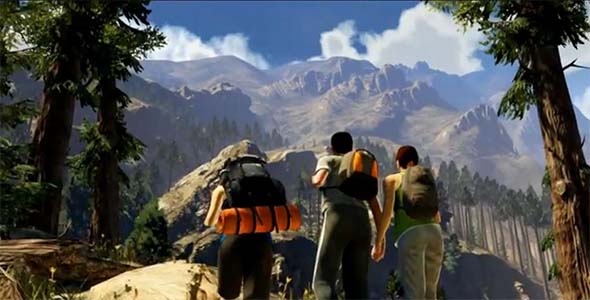
Previews implied that there might be a hiking / backpacking / camping mini-game or sub-plot.
And while we're on the topic of the player planning heists out in the countryside, maybe another thing that this game needed is for the characters to need to occasionally just get away from it all and escape into the country. Michael can occasionally play golf to ease his tensions; maybe he could have also occasionally needed to go out on a hike or a camping trip. Maybe the need to lay low should have forced Trevor into the woods to live for a period as a "feral man", or to grab a gun and go hunting. Perhaps the characters' stats could have been set to degrade if they didn't practice their abilities out in the world in between missions. Put simply, these large, empty regions of the map should have been tied more into the characters' narrative progression.
Of course, this would mean that there would need to be things for the player to do in the back country. The game already includes BMX races, hunting, and the occasional side characters with small quests to complete. Many of these mini-games are tutorialized once, and then never used again. Do you even remember that there was a deer hunting mini-game in GTAV? Going hiking and/or camping does seem like it was (at some point) a mechanic in the game that might have gotten cut, as early trailers showed scenes of a family (presumably Michael, his wife, and daughter) going on a backbacking trip up into the mountains.
Travelling with Ellie across the world of The Last of Us
This one isn't going to be so much a suggestion as it is more of a hypothetical brainstorm. What if The Last of Us had been an open world game? I (and many others) have criticized Naughty Dog's masterpiece of interactive storytelling for what we perceive to be weaknesses in the way in which the game fails to incorporate Ellie into the actual gameplay.
She's invisible to the bad guys during stealth, and so the player never has to worry about her during the stealth segments. Perhaps a mechanic in which the player has to clear a path or distract the enemies in order to call or gesture for Ellie to leave cover and come to you would have helped? She can also take care of herself during combat, which means we don't have to babysit her when a gun fight breaks out, nor do we have to hide her in a dumpster like in Resident Evil 4. So again, she was mostly a non-factor in terms of gameplay. So other than the handful of puzzles (usually consisting of finding a ladder), the player never has to directly interact with Ellie in the actual game. This was a bit of a problem for a game that was all about the relationship between the two characters.
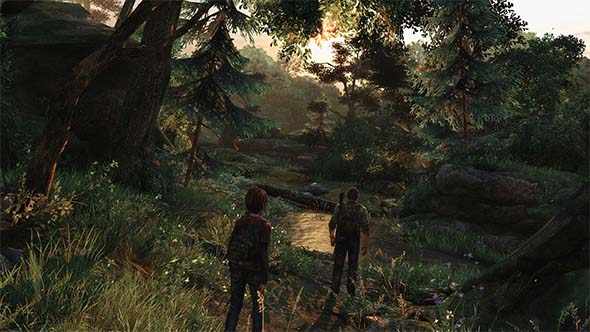
An open world design could have given Joel and Ellie more procedural, in-game bonding opportunities.
So let's go back to the question of "what if The Last of Us had been an open world game?" Well, we could have gotten gameplay segments of Joel and Ellie simply traveling together. They would have time to talk to each other, bond, maybe Ellie could try to play games with Joel, or so on. There would have been a lot more room for interaction between the two that wouldn't be limited to cutscenes. Think of all the time that you spent wandering the wilderness of Skyrim with Lydia; now imagine that the dialogue and interactions between you and Lydia had been written by Naughty Dog instead of Bethesda. We could also have gotten the ability to chose whether or not to travel through particularly dangerous places (such as zombie-infested buildings or bandit camps), and the game could have included friendly NPCs who the player could talk to, trade with, steal from, or murder. This could have perhaps resulted in moments of tension similar to This War of Mine. When you notice or meet another person during your travels or while scavenging for supplies, there'd be a tense moment as you both wonder whether the other is going to greet you or draw a gun.
Would this have made for a better game or a better story? Not necessarily. But, if implemented with some creativity from Naughty Dog, could have provided more opportunities for a player-centric exploration of the game's central theme: who is the "us" referenced in the game's title, and what would you do to protect them? Hey, maybe that could be an idea for a sequel!
Spinning webs of any size, catching theives just like flies
One piece of exciting news from this year's E3 is that Insomniac (creators of Ratchet & Clank and Sunset Overdrive) will be developing a PS4-exclusive Spider-Man game. I was kind of hoping that Beenox would get a chance to make another Spider-Man game free of a movie tie-in. But since a new developer is taking over, I hope that they learn from Beenox's mistakes. For starters, the game isn't (as far as I've seen) based on a movie tie-in, which is a promising start. it also looks like it has a triple-A budget, and it hopefully won't be pressured to meet the hard deadline of a movie's release.
Hopefully, the new Spider-Man exclusive for PS4 doesn't make the same mistakes as Beenox made.
It'll free the developers up to make other mistakes: like creating ugly new Spidey costumes.
Setting aside the initial impression that the costume is ass-ugly (honestly, why do movie and game-makers insist on screwing with one of the best and most iconic costumes in all of comic book history?), the game actually looks very promising. The footage presented in the trailer is supposed to be in-engine. However, given that the game has no actual title (it is tentatively being called "Spider-Man PS4"), and considering that the developer has stated that they won't even be announcing a release date any time soon, I'm very skeptical that the footage shown will actual be representative of the final game.
Based on what has been shown, it looks like the game will be set in an open world New York, which currently looks to be packed pretty tightly with traffic and pedestrians (the sparse population of people and cars was always a problem for earlier iterations of Spider-Man games). Insomniac looks like they've nailed the mobility and kinetics of Spider-Man. Hopefully, they'll also succeed where Beenox failed and will absolutely nail the web-swinging mechanics as well. I hope they retain some of the controls of Amazing Spider-Man 2, which mapped Spidey's left and right web shooters to the left and right trigger buttons (respectively), and I hope that the physics are tight and that the city feels properly scaled so that web-swinging through the world has a high skill ceiling.
The game looks to be pitting Spidey up against a gang of mask-wearing thugs, which means that the game could put a focus on Spider-Man fighting crime across the city rather than being challenged by a particular super villain. Maybe there will also be a greater focus on protecting civilians and reducing collateral damage? This is also something that I feel is a good approach for a game, and I hope that the game employs some kind of turf war mechanic in which the bad guys actually control areas of the city and fight to maintain territory or reclaim lost territory. Hopefully, this game will also make good use of the vertical space by giving the player lots to do both on the ground and high up in the skyline.
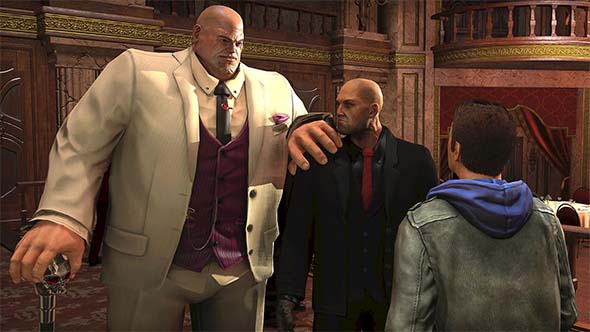
Amazing Spider-Man 2 has short segments of gameplay as Peter, but it was just glorified exposition cutscenes.
But one of the biggest elements that has always been missing from Spider-Man games is that the player never has to play as Peter Parker. Amazing Spider-Man 2 paid lip service by including some walk-around missions as Peter, but these were basically just glorified exposition cutscenes in which Peter interviewed certain characters. I want to see the player actually have to balance Peter's responsibilities as Spider-Man with his actual personal life, school, and work. Having to drop what he's doing to high-tail it back to school before he misses classes could be a great way of putting pressures on the player to be aware of where you are on the map. Having to plan your patrol routes to keep you close to school, or to other locations where Peter might have to be could have the potential to add some strategic depth to the process of mission selection and free roam play, as well as serving to make the city of New York feel genuinely huge.
"Fast Travel" versus "Simulated Travel"
Before I wrap this up, there's one more foundational concept of open world games that I want to speak about: fast travel systems. Fast travel systems are a necessary evil in virtually all open world games, especially as maps continue to get larger and games continue to get longer. Having to trek back and forth between cities in the maps of Skyrim or The Witcher every time you need to go back to a shop or check-in with a quest-giver would be really tedious and would kill the pacing of the game. But at the same time, the fast travel system is one of the features that completely sucks away the need to make a game's world really tight and cohesive and serves to emphasize that the game isn't so much about the space of the map, but rather it's about the individual locations that exist in the map.
Another case study: Dark Souls versus Dark Souls II
Dark Souls and Dark Souls II offer a really good case study for this sort of thing. The first Dark Souls is renown for having a very well-designed world tightly packed with shortcuts and secrets. Even though the entire game takes place in part of a single walled city, the forest and cliffs adjacent to it, and the catacombs and caverns below it, this game's map feels huge! That hugeness mostly comes predominantly from the verticality of the map, but it also stems from the tremendous sense of place and scale. Lordran and its adjoining areas feel very real and functional. All the locations feel like they serve a purpose and fit together in organic and believable ways. The verticality and compactness of Dark Souls' map is a direct result of the deverloper deciding not to provide a fast travel system (at least, not until late in the game). Instead of letting the player teleport from one end of a sprawling world to another, the level designers had to work overtime to create a set of regions that linked back into each other in multiple places, so that travel never becomes completely tedious. And when the game finally opens up into more sprawling, disconnected areas, the designers kind of cave and give the player fast travel.
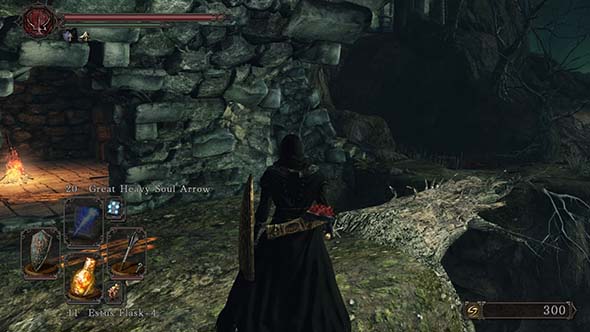
Giving players access to fast travel from the start makes shortcuts pointless!
Compare this to Dark Souls II, which provides fast travel right from the start. The world became much less vertical, much less interconnected, and much less believable. I'm not sure which decision came first, the decision to make the game world cover more land area, or the decision to provide fast travel fro the start, but the two definitely go hand-in-hand. I lean towards the decision to make the game world more sprawling being the earlier decision, since pointless shortcuts like the tree in Huntsman's Copse probably wouldn't even exist if the developers had planned for bonfire fast travel from the start. In any case, the end result is that the player doesn't re-visit very many areas of the game, and you're less likely to go back and find secrets you missed or talk to NPCs after you first meet them. Shortcuts between levels become moot, and even shortcuts within levels became unnecessary due to the density of bonfires. It also didn't help that some transitional areas seemed to have been cut (like a supposed snowy mountain level that was supposed to lie between Harvest Valley and the Iron Keep). This all combines to make the world feel dull and un-memorable, as well a logical impossibility.
Paying for fast travel
Having easily-accessible fast travel is more likely to result in the map designers following a more modular approach to the game, in which they make a sprawling map and then fill it with interchangeable locations that provide the bulk of the gameplay. Games like The Witcher III and Grand Theft Auto IV took steps to limit the use of fast travel. In The Witcher III, Geralt can only fast travel from one signpost to another signpost (usually found in towns or at crossroads). In GTA IV (and V), the player must hail a cab in order to fast travel, and you must pay extra if you want to skip the actual drive! And then there's the fast travel system of Fallout: New Vegas, which depletes some of the character's food, hunger, and sleep meters based on the distance traveled. These sorts of system are leaning slightly in the direction of "simulated travel".
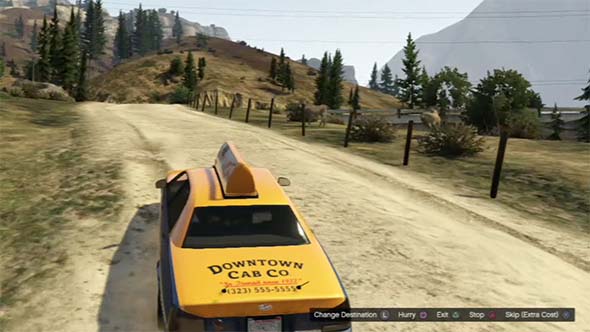
The player can pay more money in GTA V to skip the cab ride and save time.
"Simulated travel" is an alternative to fast travel in which the game makes effort to simulate the effects of travel without the player actually having to perform the travel. This only works in games in which traveling costs some kind of resource, but it can also be expanded in other ways. Games could roll a chance that the character's travel is interrupted by a random event, which could force the player to play out the encounter before being able to continue to their destination. This is a common element of table-top RPGs, and is analogous to how overworld travel in Fallout and Wasteland works.
The idea here is to give the player the option to play out the traversal manually, under the assumption that the player will more optimally spend your resources. Fast travel (which skips straight to the destination) would incur greater cost or risk (whether it be money, time, food, etc.). This is comparable to how strategy games like Total War allow the player to simulate battles. In Total War games, you have the option to let the CPU just simulate the battle, which will pseudo-randomly determine how many losses each army will suffer based on their relative strengths and composition at the start of battle. In these games, simulating the battle typically results in greater losses for the player's army (and the interface option clearly informs the player of this). If you actually play the battle, then the player can execute more optimal tactics and better micro-manage your individual units in order to win the battle with fewer casualties. Or you could terribly screw up and get your whole army killed...
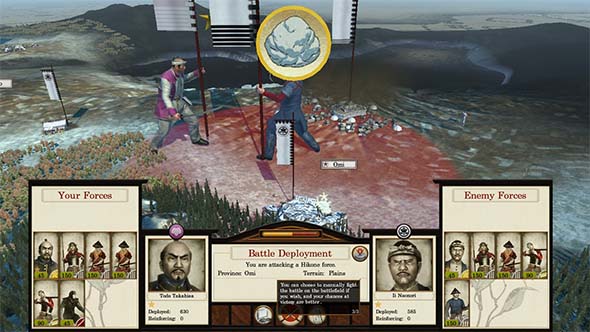
Simulating battles in Total War games is riskier than playing them yourself.
Simulating battles is an option that is basically intended for battles that appear to be very decisive one way or another. If you outnumber your opponent by ten-to-one, then you probably don't want to waste your time manually controlling the battle. So you simulate it and take a couple extra casualties. It can also work vice versa. If your opponent outnumbers you, and the battle is hopeless, then you can just simulate it to get it over with. If the battle is expected to be close, then simulating may be more likely to result in a loss; whereas, manually playing the battle will be more likely to result in a win. Optimal play would require that the player always manually play the battles, but you're free to chose not to if you don't want to commit the time.
Open world games could work similarly. Actually playing the game should result in the optimal outcome: lowest resource consumption, fastest in-game traversal time, and greatest odds of getting rewards or avoiding conflict. Fast travel should also have a cost or greater risk associated with it. It should consume more resources, take up more in-game time, result in finding less (if any) rewards, and would leave the odds of avoiding conflict up to a random die roll. This could encourage the player to actually travel across the map themselves, which could (in turn) encourage the developers to be more aware of how the spaces in the world relate and connect, which could (hopefully) result in better-designed worlds and a greater focus on actually playing within that world space. Or at the very least, games could require that the player plan a specific route of fast travel. Taking a safer route would decrease the odds of being pulled out into an encounter, but might be a longer, more roundabout path that consumes more resources.
A road trip through the open world
Playing an open world game should be like going on a road trip. The best road trips aren't the ones in which you beeline to a destination. They're the ones in which the journey is half (or most) of the fun. The trip itself should be something to remember, not just the place that you end up at. And the drive itself shouldn't feel like a chore. It should feel like an activity in and of itself. Similarly, an open world game shouldn't just be a series of map markers that you uncover or missions that you complete. The journey - the adventure - should be part of it too. So many open world games seem to lose sight of that, and once the initial excitement of exploring the vast world dies down, the map stops being a game space, and simply becomes a mission select screen.